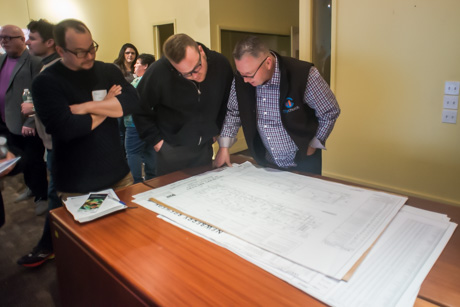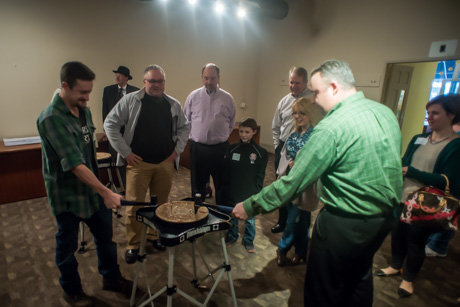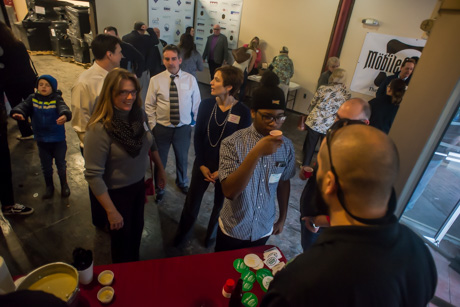There should be no lack of motivation for Dairy Farmers of America to start production back up at the former Muller Quaker Dairy plant in Batavia it acquired in January 2016 for $60 million.
That was a big outlay on a plant that is considered state-of-the-art, is USDA certified, close to milk supplies, in the midst of a transportation hub, and cost PepsiCo and Theo Muller Group more than $200 million to construct.
There is also more milk being produced than there are places to process it in the Northeast and that has led to some milk dumping so it doesn't get added to the market supply.
Finally, there is the whopping $655,155 tax bill DFA paid in 2017 over and above what their obligation could have been with a new PILOT (Payment In Lieu of Taxes) agreement, which is wholly contingent on Kansas City, Kansas-based DFA putting the plant to productive use.
Genesee County Economic Development Center CEO Steve Hyde notified officials with City Schools, Genesee County and the Town of Batavia in January that those jurisdictions could expect suspension of the PILOT agreement Muller Quaker received to build the plant because there was no clear indication what DFA planned to do to live up the basic premise of the PILOT, which is that there would be people working at the plant.
"They will pay full taxes until it's back in productive use and people are back to work," Hyde told The Batavian. "DFA has been good with us and good to work with, but we want to see the plant back in productive use, and they want their members to be able to ship milk to that plant."
The Batavian obtained copies of the letters sent to local officials through a FOIL (Freedom of Infomation Act letter) request. The letters show that City Schools received an extra $427,397, the county received $180,476, and the Town received $47,282.
Hyde said the payment requirement was consistent with the original terms of the PILOT and would not have come as a surprise to DFA.
As for DFA's plans, spokeswoman Kim O'Brien said the plans are taking shape. It's a lot of work to bring a number of big players together to get a plant like this back into production, but she said DFA would announce its plans within weeks.
It's unclear if DFA will operate the plant itself, partner with other companies, lease it or sell it, and O'Brien said she couldn't comment beyond acknowledging that DFA would make an announcement soon.
There are reportedly other major players in the dairy industry interested in the plant and Shelly Stein, a co-owner of Stein Farms in Le Roy, a DFA member, said it's common knowledge that DFA has had the plant on the market, but she also doesn't know what DFA's plans are. She said she's just eager to see it processing milk again to help alleviate the oversupply problem for dairy farmers.
"In the dairy business, there are a lot of partnerships and relationships that go into running plants like this, and that's the model DFA uses," Stein said. "I believe that is still the thought process and as a member of the cooperative, I look forward to that plant being up and running, but at this point, all of the stars have to line up. The size of that plant means it's not going to be an overnight fix."
Sarah Noble Moag, of Noblehurst Farms in Linwood, and also a DFA member, said they are eager to see the plant reopen, but they also understand why it's taking so long to get something going.
"After having seen Muller Quaker come in with its business plan and fail, we want to see something for our local economy and our local jobs that is more stable, and if that takes a little more time to plan, then so be it," Noble Moag said. "We all know in this business how long those negotiations can take, especially for an asset that size."
According to documents obtained by The Batavian as part of a FOIL request, there was active communication between GCEDC and DFA, but in July, the communication, at least the written communication, abruptly stopped. We are told that's an accurate reflection of the state of things from that point forward, that there isn't any communication not part of the response to the FOIL request.
In February of 2016, DFA officials were diligent about making sure its logo was added to the business part sign along Route 5. In March, Chris Suozzi, VP of business development, started trying to find out from DFA officials what their plans were so he could put together a new incentive package that recognized the expense of the retooling of the plant.
Jackie Klippenstein, with DFA, asked for clarification on possible incentives on April 28, telling Suozzi, "it appears discussions at the end of the hall are intensifying."
In response, Suozzi wanted to know how much DFA was planning to invest in the plant.
The number he got back was $250,000 for equipment and $100,000, rough estimate, for labor.
On April 29, 2016, he emailed Jackie Klippenstein to try and clarify DFA's plans.
"Based on other food processing facilities in our county, that number appears low, unless you're making yogurt," Suozzi wrote. "Can you share what products will be produced? Maybe I can understand better. Will you be using existing equipment from Muller Quaker Dairy? Do you already own equipment that you're bringing in? If so we will need to understand the capital expense."
He also asked, "is the 150 jobs to start or is a ramp-up schedule over the course of time (i.e. 2-year ramp up)?"
Suozzi apparently didn't get a response and followed up on May 3 and suggested a phone call.
Klippenstein responded May 10 and said, "We aren't quite ready -- but I expect information in the next 2-3 weeks. Stop and go, stop and go ... sorry but feeling optimistic."
Suozzi again followed up on June 1, 2016, and Klippenstein responded, "Thanks for checking in. I've been told July is the golden month when things will start to come together -- decisions made."
On July 6, 2016, Suozzi again requested a project update and the documents obtained by The Batavian, which we are told are complete, contains no response from Klippenstein or anybody else from DFA.
As part of the documents obtained by The Batavian, there is a state form DFA was required to fill out which lists employees and wages paid for 2016. The NYS-45-ATT shows DFA had seven employees at the plant with a total payroll of $408,006. The names of the employees are redacted, but the top gross pay was $72,195, with one other employee earning more than $70,000, two making more than $50,000, one making $41,883, and three earning at least $35,000. Their job duties are not listed as part of the form.
Hyde, like other officials we've talked to around the county, remains optimistic that the plant, so big, so well situated and well suited to dairy processing, will eventually be put to productive use. It's just a matter of time.
"It's not perfect what happened, but we have a couple hundred million dollar processing plant that is essentially new and largely funded on the backs of PepsiCo and Theo Muller," Hyde said. "We'll eventually have a production facility in there. It's a great asset to have in our community."
Stein, who is also a county legislator, agreed.
"It’s an asset that continues that get a lot of traction," Stein said. "I’m glad it’s in DFA’s hands. It’s the largest dairy cooperative in the nation. As a member, when a deal is worked out, whomever or whatever it’s going to be, it's going to be good for all milk producers in the area one way or another because it’s still milk."















